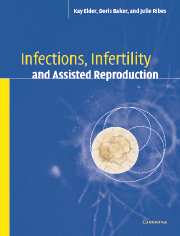Book contents
- Frontmatter
- Contents
- Foreword
- Preface
- Acknowledgements
- Part I Overview of microbiology
- Part II Infections in reproductive medicine
- 7 Genital ulcer diseases
- 8 Vaginitis syndromes
- 9 Genital human papillomavirus (HPV) infections
- 10 Urethritis and cervicitis syndromes
- 11 Pathology of the upper genitourinary tract
- 12 Cytomegalovirus and blood-borne viruses
- Part III Infection and the assisted reproductive laboratory
- Index
8 - Vaginitis syndromes
from Part II - Infections in reproductive medicine
Published online by Cambridge University Press: 29 October 2009
- Frontmatter
- Contents
- Foreword
- Preface
- Acknowledgements
- Part I Overview of microbiology
- Part II Infections in reproductive medicine
- 7 Genital ulcer diseases
- 8 Vaginitis syndromes
- 9 Genital human papillomavirus (HPV) infections
- 10 Urethritis and cervicitis syndromes
- 11 Pathology of the upper genitourinary tract
- 12 Cytomegalovirus and blood-borne viruses
- Part III Infection and the assisted reproductive laboratory
- Index
Summary
The female genital tract hosts a variety of microbial organisms: composition of the normal flora varies according to the woman's age, site in the genital tract and hormonal status (prepubertal, different phases of the menstrual cycle, pregnancy, oral contraceptive use, hormone replacement therapy and postmenopausal). Vaginal secretions are usually clear, scanty and have a pH below 4.5. Normal vaginal flora usually favours colonization by the hydrogen peroxide producing Lactobacillus spp.; these organisms use epithelial glycogen and produce lactic acid, leading to the resultant normally acid pH of vaginal secretions. Imbalance in the vaginal flora or infection with some sexually transmitted pathogens may lead to abnormal vaginal discharges associated with inflammation. Not all vaginal discharges are vaginal in origin – uterine infections or mucopurulent cervicitis will also result in a discharge from the vagina.
Vulvo-vaginitis can have several different etiologies; three types of vulvo-vaginitis syndromes will be reviewed here:
trichomoniasis, caused by the protozoan Trichomonas vaginalis;
candidiasis (‘thrush’), caused by the yeast Candida albicans;
bacterial vaginosis, due to overgrowth with the anaerobic bacteria, Mycoplasma hominis and Gardnerella vaginalis or other Candida spp.
The vaginitis syndromes are significant from several standpoints.
Trichomoniasis, and rarely some candidal infections, are considered to be sexually transmitted. The mode of transmission for bacterial vaginosis is unknown. Although there is some evidence to suggest that bacterial vaginosis is sexually transmitted, this conclusion is not supported by the bulk of the evidence.
- Type
- Chapter
- Information
- Infections, Infertility, and Assisted Reproduction , pp. 199 - 214Publisher: Cambridge University PressPrint publication year: 2004



